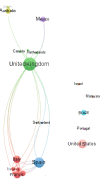Computerized cognitive stimulation for people with dementia or with mild cognitive impairment: a bibliometric review
- PMID: 33907595
- PMCID: PMC8049572
- DOI: 10.1590/1980-57642021dn15-020003
Computerized cognitive stimulation for people with dementia or with mild cognitive impairment: a bibliometric review
Abstract
Many studies have found that non-pharmacological interventions, such as cognitive stimulation (CS), can benefit people with dementia (PWD) or with mild cognitive impairment (MCI). The use of the computerized cognitive stimulation (CCS) had proven to be an ally to those who want to detect and mitigate this disease.
Objective: The purpose of this paper was to analyze the scientific production in CCS in PWD or with MCI in journals indexed in Clarivate Analytics' Web of Science and Elsevier's Scopus since 2000.
Methods: Data collected from Web of Science and Scopus during 2000-2019.
Results: The data show that dementia research is exponentially developing following the evolution of widespread use of computer science. As such, this article was of enormous importance doing a bibliometric analysis of what has been done in the area since the beginning of this century. The search terms identified 61 papers related to the use of computers applied to CS in PWD or MCI, and the International Journal of Geriatric Psychiatry and Journal of Alzheimer's Disease had the largest number of publications. The most cited article was the Faucounau et colleagues. Major research' countries are United Kingdom, Spain and United States.
Conclusions: The findings in these papers were analysed to find recommendations for future work in this area. The CCS has been increasingly used as an intervention tool for PWD or MCI, and there still seems to be a possibility for evolution in good quality publications.
Muitos estudos têm demonstrado que as intervenções não farmacológicas, como a estimulação cognitiva (EC), podem beneficiar pessoas com demência (PCD) ou com declínio cognitivo ligeiro (DCL). O uso da estimulação cognitiva computadorizada (ECC) tem mostrado ser um meio para detetar e mitigar essa doença.
Objetivo: O objetivo do presente artigo foi analisar a produção científica em ECC em PCD ou com DCL publicada em revistas indexadas na Web of Science da Clarivate Analytics e na Scopus da Elsevier desde 2000.
Métodos: Os dados foram coletados na Web of Science e Scopus relativamente aos anos 2000–2019.
Resultados: Os dados mostram que a pesquisa em demência está se desenvolvendo exponencialmente, acompanhando a evolução do uso generalizado da ciência da computação. Dessa forma, o estudo foi de enorme importância para uma análise bibliométrica do que tem sido feito na área desde o início deste século. Os termos de pesquisa identificaram 61 artigos relacionados ao uso de computadores aplicados à EC em PCD ou DCL, e ambos os periódicos International Journal of Geriatric Psychiatry e Journal of Alzheimer’s Disease tiveram o maior número de publicações. O artigo mais citado foi o de Faucounau et al. Os principais países de pesquisa foram Reino Unido, Espanha e Estados Unidos.
Conclusões: Os resultados desses artigos foram analisados de forma a possibilitar encontrar recomendações para trabalhos futuros nessa área. A ECC tem sido cada vez mais utilizada como ferramenta nas intervenções para PCD e DCL, e ainda parece haver possibilidade de evolução em publicações de boa qualidade.
Keywords: bibliometrics; cognition; computers; data analysis; dementia.
Conflict of interest statement
Disclosure: The authors report no conflicts of interest.
Figures
Similar articles
-
A bibliometric study of the top 100 most-cited randomized controlled trials, systematic reviews and meta-analyses published in endodontic journals.Int Endod J. 2019 Sep;52(9):1297-1316. doi: 10.1111/iej.13131. Epub 2019 May 13. Int Endod J. 2019. PMID: 31009099 Review.
-
Mini-Mental State Examination (MMSE) for the early detection of dementia in people with mild cognitive impairment (MCI).Cochrane Database Syst Rev. 2021 Jul 27;7(7):CD010783. doi: 10.1002/14651858.CD010783.pub3. Cochrane Database Syst Rev. 2021. PMID: 34313331 Free PMC article.
-
Effectiveness of computer-based interventions for community-dwelling people with cognitive decline: a systematic review with meta-analyses.BMC Geriatr. 2023 Apr 12;23(1):229. doi: 10.1186/s12877-023-03941-y. BMC Geriatr. 2023. PMID: 37041494 Free PMC article.
-
A bibliometric analysis on the health behaviors related to mild cognitive impairment.Front Aging Neurosci. 2024 May 3;16:1402347. doi: 10.3389/fnagi.2024.1402347. eCollection 2024. Front Aging Neurosci. 2024. PMID: 38765772 Free PMC article.
-
Tooth auto-transplantation: A bibliometric analysis of the top 100 most-cited articles.Dent Traumatol. 2023 Feb;39(1):64-81. doi: 10.1111/edt.12779. Epub 2022 Aug 16. Dent Traumatol. 2023. PMID: 35972826
Cited by
-
Global trends and hotspots of exercise interventions for mild cognitive impairment: A global bibliometric analysis.Medicine (Baltimore). 2024 Sep 13;103(37):e39550. doi: 10.1097/MD.0000000000039550. Medicine (Baltimore). 2024. PMID: 39287229 Free PMC article.
-
EU27 Higher Education Institutions and COVID-19, Year 2020.Int J Environ Res Public Health. 2021 Jun 2;18(11):5963. doi: 10.3390/ijerph18115963. Int J Environ Res Public Health. 2021. PMID: 34199415 Free PMC article.
-
Tablet- and Group-Based Multicomponent Cognitive Stimulation for Older Adults With Mild Cognitive Impairment: Single-Group Pilot Study and Protocol for Randomized Controlled Trial.JMIR Res Protoc. 2025 Feb 21;14:e64465. doi: 10.2196/64465. JMIR Res Protoc. 2025. PMID: 39983114 Free PMC article.
-
Computer Education and Third Age Universities: A Systematic Review.Int J Environ Res Public Health. 2021 Jul 10;18(14):7390. doi: 10.3390/ijerph18147390. Int J Environ Res Public Health. 2021. PMID: 34299841 Free PMC article.
References
-
- Alzheimer’s Association 2019 Alzheimer’s disease facts and figures. Alzheimers Dement. 2019;15(3):321–387. doi: 10.1016/j.jalz.2019.01.010. - DOI
-
- Pestana MH, Sobral M. Alzheimer’s disease research: a network science approach. Int J Multivar Anal. 2018;1(3):201–217. doi: 10.1504/IJMDA.2018.091838. - DOI
LinkOut - more resources
Full Text Sources
Other Literature Sources
Medical
Research Materials




